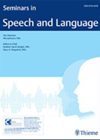
Journal Reviews
How long is too long? Waiting times for speech and language therapy
Waiting lists are a reality of clinical practice, and many health and social care professionals become used to having to cope with this. The authors of this paper addressed this issue by examining written submissions to the 2014 Senate Inquiry...
Doing it for the people: how to do speech and language therapy
This review article distils 58 studies, collating information from people with aphasia, their families and clinical speech and language therapists summarising the seven habits of highly effective aphasia therapists. Habit 1: Effective therapists invest time in and prioritise relationships with...
People with dementia and their families want to see speech and language therapists!
Language and communication difficulties are common in Alzheimer’s disease and, of course, language-led dementia (primary progressive aphasia). Communication difficulties are highlighted as one of the biggest burdens for family members caring for loved ones with dementia. This is often associated...
Difficult consultations with HPV-positive oropharnyeal cancer patients
The aetiological role of human papillomavirus (HPV) in oropharyngeal squamous cell carcinoma (OPSCC) is well established, and its incidence has massively increased over the last decade, whilst the incidence of HPV-negative OPSCC is declining. Although we know that HPV-positive OPSCC...









